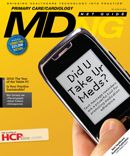Publication
Article
MDNG Primary Care
Who Will Be Left to Care for All of These Newly Insured Patients?
Author(s):
Many physicians are viewing the health care reform bill as the final straw in a decades-long process that has eroded physicians’ decision-making authority by replacing their freedom to exercise their expert medical opinion in the best interests of their patients with administrative and bureaucratic interference and government overreach into their professional and business lives.
The end result of this meddling is a compromised physician-patient relationship, a toxic financial environment that forces medical practices to operate at razor-thin profit margins and stifles the entrepreneurial impulse in too many physicians, and a physician workforce, already stretched too thin in key areas like primary care, that may have reached its breaking point.
How long will it be before a critical mass of physicians decides enough is enough and leaves the practice of medicine? If several polls, comments from physician bloggers and readers of our publications and websites, and anecdotal evidence gleaned from conversations and correspondence are any indication, that day may be fast approaching. One such indicator may be found in the results from a survey conducted by The Medicus Firm, a national physician search firm. Medicus surveyed more than 1,000 physicians to “determine their expectations as to the impact of health reform on their practices, income, job satisfaction, and future career plans.” The results of the survey were eye-opening: nearly one-third of respondents said they would consider leaving the practice of medicine if the Democrats’ and President Obama’s health care reform proposals became law. A full 46% of primary care physicians who responded to the survey said that “they would leave medicine or try to leave medicine as a result of health reform.” Nearly 50% of respondents said that their income and practice revenue would be “negatively impacted” by health care reform legislation. This included 14% of respondents who said that income and practice revenue would “decline or worsen dramatically” and 36% who said it would “decline or worsen somewhat” because of health care reform. In remarks about survey, Kevin Perpetua, managing partner at The Medicus Firm, said that “many physicians feel that they cannot continue to practice if patient loads increase while pay decreases,” and that “the overwhelming prediction from physicians is that health reform, if implemented inappropriately, could create a detrimental combination of circumstances, and result in an environment in which it is not possible for most physicians to continue practicing medicine.”
That detrimental business environment will come about in large part because of the further reduction in fees and reimbursement that will be the natural result of adding millions of patients to Medicare and then reimbursing physicians at or below Medicare rates to provide care for them. Increased patient volume plus declining pay per visit is a recipe for disaster in the long run. It’s a shame that the health care system now seems set to take advantage of physicians’ altruism and sense of calling by piling more financial burdens on them and placing additional obstacles between them and their patients.
Where this all will end and what it will ultimately mean for physicians and their patients has yet to be determined, but the early signs are far from promising. If the initial reaction from the physician community is any indication, proponents of the current health care reform bill may get more than they bargained for if physicians and patients have to make do with less.
Thank you for reading.
Mike Hennessy
